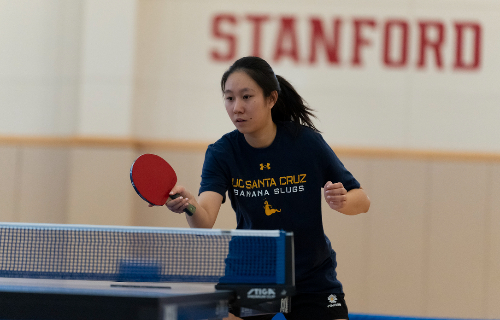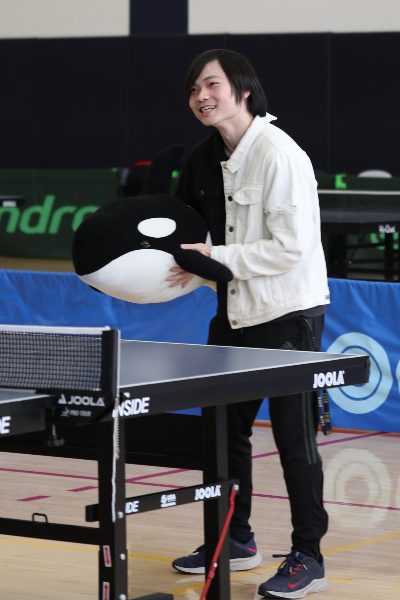Campus News
Net wins
The UC Santa Cruz table tennis team, an informal group formed only in 2022, quickly began finding success at tournaments—but its biggest wins may be the community, friendship, and leadership skills the team has built along the way.

The atmosphere in the arena was intense. Hundreds of competitors were warming up with drills, stretches, and rallies. Cheers and shouts echoed from the walls, the lights blazed, and the athletes were serious.
The UC Santa Cruz team observed the scene, hugging their traditional giant plushies and doing their mental preparations. They had driven 450 miles to UC San Diego through hellacious traffic and deluges of rain, and their co-captain was sick.
But this scrappy group of students had fought and won their way through divisional competitions and made it to the 2023 collegiate table tennis regional tournament—and they were there to play.
“There were a lot more professional players than at the divisionals, and I could definitely feel that it was way more competitive and serious because people really, really wanted to move on to nationals,” said Jing-Ting Lai (Merrill ’24, business management economics and psychology).
Tournament dreams
The table tennis team formed just two years ago as an informal group of students who loved table tennis. Things ramped up very quickly, though—that February, they went to the divisional tournament at Stanford University, even though they had only trained together for less than a week.

The reason for the rush? One of the team members was graduating soon, and she really wanted to play in the tournament.
“We decided to sign up that year, even though most of us were not ready,” said Lai, an international student from Taiwan.
“I didn’t expect to sign up for a tournament that early,” said Yuk Shing Lam, a fourth-year Ph.D. student studying pure math. “I was thinking maybe we can train for a year, and then throughout the year maybe I can also recruit other people. But since one of them was graduating soon, we just tried to help her achieve her dream.”
Recruiting team members for that first tournament was challenging. They scrambled to get enough players to form teams, using every resource they had.
“For one team member, I even told her, ‘Hey, how about that if you sign up, I’ll teach you math,’” said Lam, an international student from Hong Kong.
They got the players, and they went. The 2022 divisional tournament included three other Northern California schools.
“I didn’t really expect any of the team members to win after just a week’s training,” said Lam, who played table tennis starting at a young age and during his time as an undergraduate at UC Davis. “And their opponents have been training for their whole life, but I was just happy that I got to see some of my old friends again.”

The team didn’t win any of its games at the 2022 divisional, but they played much better than Lam had expected, which he was “really, really happy about.” They got great photos for Instagram and went out for Korean barbecue to celebrate.
“We got zero Ws—zero,” said Lai. “But we were very happy at the end because it’s just a brand-new experience and we got to meet a lot of Yuk’s old friends and his former coach, and we made some connections that went a long way—and that are still helping us today.”
On the road to regionals
That divisional experience was just the warm up—so to speak.
The team continued training. They recruited more team members, such as Zi Tao Li (Crown ’26, robotics engineering), of Honolulu, Hawaii. He had made it his goal to join a sports club during his freshman year, but he didn’t make it onto the badminton club. When Lai, who is an RA for Crown and Merrill colleges, hosted a community table tennis tournament, Li was hooked.
They got one more table, doubling their previous equipment, since they had only one before. They applied to become an official club, though they say the process is lengthy and they haven’t finished yet, though they plan to.
There are two divisionals run by the National Collegiate Table Tennis Association that decide if a team qualifies for the regional. In 2022, the UCSC team joined so late that it could only enroll in the second one.

But during the rest of that year, they participated in two more divisionals. The hard work, practice, and dedication paid off, and they qualified to move on to the 2023 regionals.
They packed two cars with 11 people for the 10-hour drive through the epic atmospheric river storms of late February 2023, slogging through traffic the whole way. They rented an AirBnB with their own funds, went grocery shopping, and cooked dinner. Lam unfortunately fell ill before they left, but he tested negative for COVID-19. He came along, toting board games, but laid low.
“So we played games without him because he was dying in the bedroom, but we had a lot of fun,” said Lai.
Community and connection
The tournament space at the 2023 regional—UC San Diego’s RIMAC Auxiliary Gym—was much bigger than the divisional space at Stanford. The regional included schools from all of California plus Arizona and more.
The Slugs played hard, and they kept winning—all the way to the quarter final.
“We beat some of the teams that were traditionally strong because we had better strategy,” said Lam.
One Slug team member who played in the individual category did continue on to nationals—Wendy Chen (Cowell ’24, computer game design). Their goal is one day to have the whole team making it to nationals.
While none of the Slugs playing in the teams category moved on to nationals, they won in so many other ways—because being part of a team and playing a sport have meaningfully enriched their lives and their student experience.
“It allows me to be in this community that I really enjoy,” said Lai. “Everybody has different physical strength, and different abilities and skill sets. So it’s about meeting people where they’re at and finding balance between training other people, training myself, and managing my time.”
Li reflected that while of course they’re in college studying and focusing on academics, table tennis is “a really fun activity to connect with people who have the same interests. And also going to practice is really fun.”
For Lam’s part, he said it might sound dramatic, but he feels like playing table tennis reminds him that “I’m still a person.”
As a student teacher, he goes to math classes, teaches math classes, and has a cubicle office.
“So I’m just there 24/7. I’m practically married to the school,” he said, with a laugh. “And being able to play table tennis, I get to go outside of my office. And also sometimes I get to travel with the team, and I get to connect to other people who don’t just talk about math.”
On top of that, he said, it’s also taught him the importance of teamwork, as well as helped him develop leadership and interpersonal skills.
“The team pushes me to be a better person so that I can lead them better,” he said. “And then later on maybe I can have some kind of positive impact on them, as well.”
Team members pictured above: Left to right standing: Junle (Leo) Yuan, Tejas Vaze, Benji Mencer, Ethan Bautista, Caroline Yu, Greyson Meyer, Zoë Moreland, Rithwik Vaidun, Jerry Zu. Left to right kneeling: Weiqi (Wendy) Chen, Darren Lee, Jing-Ting Lai, Yuk Shing Lam, Jackie Ma, Van Ly, Wichapas (Harry) Pichetpongsa